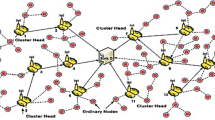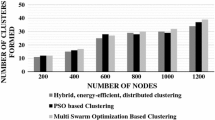Abstract
Trustworthiness and energy efficiency are two important aspects of data gathering in Wireless Sensor Networks (WSNs). The first criterion can be fulfilled by adopting trustworthy nodes for data communication along with choosing watchdogs for monitoring. Additionally, the use of the clustering scheme reduces energy exhaustion substantially. Accordingly, effective data gathering requires trust-aware and energy-efficient clustering, data gathering tree construction, and watchdog selection. The previous data gathering algorithms did not include all of the clustering, tree construction, and watchdog selection phases. Furthermore, some studies proposed greedy schemes to solve the mentioned phases and had low performance. In this paper, we propose the Trust-aware and Energy-efficient Data Gathering (TEDG) algorithm to gather data more effectively. The proposed scheme comprises all the above-mentioned phases, including clustering, tree construction, and watchdog selection. These phases are modeled as optimization problems, and they are solved using Particle Swarm Optimization (PSO). The watchdog selection phase has variable-length particles because the number of watchdogs has not been unknown. Novel particle representation and initialization schemes are proposed to handle these particles. According to the performed simulations, TEDG improves consumed energy for data delivery to the sink, standard deviation of the residual energy of nodes, and network lifetime by 220%, 81%, and 129%, respectively.























Similar content being viewed by others
Data availability
Data sharing not applicable to this article as no datasets were generated or analyzed during the current study.
References
Abdellatif T, Mosbah M (2020) Efficient monitoring for intrusion detection in wireless sensor networks. Concurr Comput Pract Exp 32:1–13. https://doi.org/10.1002/cpe.4907
Ansari MD, Gunjan VK, Rashid E (2021). On security and data integrity framework for cloud computing using tamper-proofing. In: Kumar, A., Mozar, S (eds) ICCCE 2020. Lecture notes in electrical engineering, vol 698. Springer, Singapore. https://doi.org/10.1007/978-981-15-7961-5_129
Arora VK, Sharma V, Sachdeva M (2020) A multiple pheromone ant colony optimization scheme for energy-efficient wireless sensor networks. Soft Comput 24:543–553. https://doi.org/10.1007/s00500-019-03933-4
Bangotra DK, Singh Y, Selwal A et al (2021) A trust based secure intelligent opportunistic routing protocol for wireless sensor networks. Wirel Pers Commun. https://doi.org/10.1007/s11277-021-08564-3
Bouali T, Senouci S-M, Sedjelmaci H (2016) A distributed detection and prevention scheme from malicious nodes in vehicular networks. Int J Commun Syst 29:1683–1704. https://doi.org/10.1002/dac.3106
Cai RJ, Li XJ, Chong PHJ (2019) An evolutionary self-cooperative trust scheme against routing disruptions in MANETs. IEEE Trans Mob Comput 18:42–55. https://doi.org/10.1109/TMC.2018.2828814
Edla DR, Kongara MC, Cheruku R (2019) A PSO based routing with novel fitness function for improving lifetime of WSNs. Wirel Pers Commun 104:73–89. https://doi.org/10.1007/s11277-018-6009-6
Elhabyan RSY, Yagoub MCE (2015) Two-tier particle swarm optimization protocol for clustering and routing in wireless sensor network. J Netw Comput Appl 52:116–128. https://doi.org/10.1016/j.jnca.2015.02.004
Fang J, Feng J (2018) Using PSO-TVAC to improve the performance of DV-Hop. Int J Wirel Mob Comput 14:358–361. https://doi.org/10.1504/IJWMC.2018.10015092
Fang W, Zhang W, Yang W et al (2021) Trust management-based and energy efficient hierarchical routing protocol in wireless sensor networks. Digit Commun Netw 7:470–478. https://doi.org/10.1016/j.dcan.2021.03.005
Ghaffari A (2015) Congestion control mechanisms in wireless sensor networks: a survey. J Netw Comput Appl 52:101–115. https://doi.org/10.1016/j.jnca.2015.03.002
Gunjan VK, Kumar A, Rao AA (2015) Present and future paradigms of cyber crime and security majors—growth and rising trends. In: Proceedings—2014 4th international conference on artificial intelligence with applications in engineering and technology, ICAIET 2014. pp 89–94. https://doi.org/10.1109/ICAIET.2014.24
Han Y, Hu H, Guo Y (2022) Energy-aware and trust-based secure routing protocol for wireless sensor networks using adaptive genetic algorithm. IEEE Access 10:11538–11550. https://doi.org/10.1109/ACCESS.2022.3144015
Heinzelman WB, Chandrakasan AP, Balakrishnan H (2002) An application-specific protocol architecture for wireless microsensor networks. Trans Wirel Commun 1:660–670. https://doi.org/10.1109/TWC.2002.804190
Hou J, Qiao J, Han X (2022) Energy-saving clustering routing protocol for wireless sensor networks. IEEE Sens J 22:2845–2857. https://doi.org/10.1109/JSEN.2021.3132682
Hu H, Han Y, Yao M, Xue S (2021) Trust based secure and energy efficient routing protocol for wireless sensor networks. IEEE Access 10:10585–10596. https://doi.org/10.1109/ACCESS.2021.3075959
Isaac Sajan R, Jasper J (2021) A secure routing scheme to mitigate attack in wireless adhoc sensor network. Comput Secur 103:1–14. https://doi.org/10.1016/j.cose.2021.102197
Khalid NA, Bai Q, Al-Anbuky A (2019) Adaptive trust-based routing protocol for large scale WSNs. IEEE Access 7:143539–143549. https://doi.org/10.1109/ACCESS.2019.2944648
Li Y, Berjab N, Le Hanh H, Yokota H (2019) Centralized trust scheme for cluster routing of wireless sensor networks. IEEE Int Conf Big Data Big Data 2019:5239–5248. https://doi.org/10.1109/BigData47090.2019.9006214
Mann PS, Singh S (2019) Improved metaheuristic-based energy-efficient clustering protocol with optimal base station location in wireless sensor networks. Soft Comput 23:1021–1037. https://doi.org/10.1007/s00500-017-2815-0
Mirjalili S, Mirjalili SM, Lewis A (2014) Grey Wolf Optimizer. Adv Eng Softw 69:46–61. https://doi.org/10.1016/j.advengsoft.2013.12.007
Mittal N, Singh U, Sohi BS (2019) An energy-aware cluster-based stable protocol for wireless sensor networks. Neural Comput Appl 31:7269–7286. https://doi.org/10.1007/s00521-018-3542-x
Mittal N, Singh S, Singh U, Salgotra R (2021) Trust-aware energy-efficient stable clustering approach using fuzzy type-2 Cuckoo search optimization algorithm for wireless sensor networks. Wirel Netw 27:151–174. https://doi.org/10.1007/s11276-020-02438-5
Monnet Q, Mokdad L, Ballarini P et al (2017) DoS detection in WSNs: Energy-efficient methods for selecting monitoring nodes. Concurr Comput Pract Exp 29:e4266. https://doi.org/10.1002/cpe.4266
Ni Q, Pan Q, Du H et al (2017) A novel cluster head selection algorithm based on fuzzy clustering and particle swarm optimization. IEEE/ACM Trans Comput Biol Bioinforma 14:76–84. https://doi.org/10.1109/TCBB.2015.244647
Pachlor R, Shrimankar D (2018) LAR-CH: a cluster-head rotation approach for sensor networks. IEEE Sens J 18:9821–9828. https://doi.org/10.1109/JSEN.2018.2872065
Pavani M, Rao PT (2019) Adaptive PSO with optimised firefly algorithms for secure cluster-based routing in wireless sensor networks. IET Wirel Sens Syst 9:274–283. https://doi.org/10.1049/iet-wss.2018.5227
Prabhu S, Mary Anita EA (2020) Trust based secure routing mechanisms for wireless sensor networks: a survey. IEEE Int Conf Adv Comput Commun Syst ICACCS 2020:1003–1009. https://doi.org/10.1109/ICACCS48705.2020.9074464
Prithi S, Sumathi S (2020) LD2FA-PSO: a novel learning dynamic deterministic finite automata with PSO algorithm for secured energy efficient routing in wireless sensor network. Ad Hoc Netw 97:102024. https://doi.org/10.1016/j.adhoc.2019.102024
Rashedi E, Nezamabadi-pour H, Saryazdi S (2009) GSA: a gravitational search algorithm. Inf Sci 179:2232–2248. https://doi.org/10.1016/j.ins.2009.03.004
Ratnaweera A, Halgamuge SK, Watson HC (2004) Self-organizing hierarchical particle swarm optimizer with time-varying acceleration coefficients. Trans Evol Comp 8:240–255. https://doi.org/10.1109/TEVC.2004.826071
Rodrigues P, John J (2020) Joint trust: an approach for trust-aware routing in WSN. Wirel Netwo 26:3553–3568. https://doi.org/10.1007/s11276-020-02271-w
Saidi A, Benahmed K, Seddiki N (2020) Secure cluster head election algorithm and misbehavior detection approach based on trust management technique for clustered wireless sensor networks. Ad Hoc Netw 106:102215. https://doi.org/10.1016/j.adhoc.2020.102215
Sajan RI, Christopher VB, Kavitha MJ, Akhila TS (2022) An energy aware secure three-level weighted trust evaluation and grey wolf optimization based routing in wireless ad hoc sensor network. Wirel Netw 28:1439–1455. https://doi.org/10.1007/s11276-022-02917-x
Sánchez-Casado L, Maciá-Fernández G, García-Teodoro P, Magán-Carrión R (2015) A model of data forwarding in MANETs for lightweight detection of malicious packet dropping. Comput Netw 87:44–58. https://doi.org/10.1016/j.comnet.2015.05.012
Shahid J, Muhammad Z, Iqbal Z et al (2022) Cellular automata trust-based energy drainage attack detection and prevention in wireless sensor networks. Comput Commun 191:360–367. https://doi.org/10.1016/j.comcom.2022.05.011
Shcherba EV, Litvinov GA, Shcherba MV (2019) A novel reputation model for trusted path selection in the OLSR routing protocol. IEEE Int Conf Inf Sci Commun Technol Appl Trends Oppor, ICISCT 2019. https://doi.org/10.1109/ICISCT47635.2019.9011870
Shyama M, Pillai AS, Anpalagan A (2022) Self-healing and optimal fault tolerant routing in wireless sensor networks using genetical swarm optimization. Comput Netw 217:109359. https://doi.org/10.1016/j.comnet.2022.109359
Singh MK, Amin SI, Imam SA et al (2018) A survey of wireless sensor network and its types. IEEE Int Conf Adv Comput Commun Control Netw ICACCCN 2018:326–330. https://doi.org/10.1109/ICACCCN.2018.8748710
Supriya M, Adilakshmi T (2022) Secure cluster-based routing using modified spider monkey optimization for wireless sensor networks. In: Bhateja V, Satapathy SC, Travieso-Gonzalez CM, Adilakshmi T (eds) Smart Intelligent Computing and Applications, 1. Smart Innovation, Systems and Technologies, 282. Springer, Singapore. https://doi.org/10.1007/978-981-16-9669-5_23
Swapnarani P, Rao PR, Gunjan VK (2022) Self defence system for women safety with location tracking and SMS alerting through GPS and GSM networks. In: Gunjan VK, Zurada JM (eds) Modern Approaches in Machine Learning & Cognitive Science: A Walkthrough.Studies in Computational Intelligence, vol 1027., 1st edn. Springer, pp 361–368
Tomić I, McCann JA (2017) A survey of potential security issues in existing wireless sensor network protocols. IEEE Internet Things J 4:1910–1923. https://doi.org/10.1109/JIOT.2017.2749883
Wang B, Chen X, Chang W (2014) A light-weight trust-based QoS routing algorithm for ad hoc networks. Pervasive Mob Comput 13:164–180. https://doi.org/10.1016/j.pmcj.2013.06.004
Wang D, Tan D, Liu L (2018) Particle swarm optimization algorithm: an overview. Soft Comput 22:387–408. https://doi.org/10.1007/s00500-016-2474-6
Wu J, Song C, Fan C et al (2019) DENPSO: A distance evolution nonlinear PSO algorithm for energy-efficient path planning in 3D UASNs. IEEE Access 7:105514–105530. https://doi.org/10.1109/ACCESS.2019.2932148
Yang H, Zhang X, Cheng F (2021) A novel algorithm for improving malicious node detection effect in wireless sensor networks. Mob Netw Appl 26:1564–1573. https://doi.org/10.1007/s11036-019-01492-4
Yin H, Yang H, Shahmoradi S (2022) EATMR: an energy-aware trust algorithm based the AODV protocol and multi-path routing approach in wireless sensor networks. Telecommun Syst 81:1–19. https://doi.org/10.1007/s11235-022-00915-0
Yun J, Seo S, Chung JM (2018) Centralized trust-based secure routing in wireless networks. IEEE Wirel Commun Lett 7:1066–1069. https://doi.org/10.1109/LWC.2018.2858231
Zhao C, Wu C, Wang X et al (2017) Maximizing lifetime of a wireless sensor network via joint optimizing sink placement and sensor-to-sink routing. Appl Math Model 49:319–337. https://doi.org/10.1016/j.apm.2017.05.001
Funding
The authors declare that no funds, grants, or other support were received during the preparation of this manuscript.
Author information
Authors and Affiliations
Contributions
Conceptualization was contributed by LF; methodology was contributed by KS and LF; software was contributed by KS; supervision was contributed by LF; validation was contributed by LF; writing—original draft was contributed by LF and MAB; visualization was contributed by KS, writing—review and editing, was contributed by KS, LF, and MAB.
Corresponding author
Ethics declarations
Competing interests
The authors have no relevant financial or non-financial interests to disclose.
Additional information
Publisher's Note
Springer Nature remains neutral with regard to jurisdictional claims in published maps and institutional affiliations.
Rights and permissions
Springer Nature or its licensor (e.g. a society or other partner) holds exclusive rights to this article under a publishing agreement with the author(s) or other rightsholder(s); author self-archiving of the accepted manuscript version of this article is solely governed by the terms of such publishing agreement and applicable law.
About this article
Cite this article
Soltani, K., Farzinvash, L. & Balafar, M.A. Trust-aware and energy-efficient data gathering in wireless sensor networks using PSO. Soft Comput 27, 11731–11754 (2023). https://doi.org/10.1007/s00500-023-07856-z
Accepted:
Published:
Issue Date:
DOI: https://doi.org/10.1007/s00500-023-07856-z




